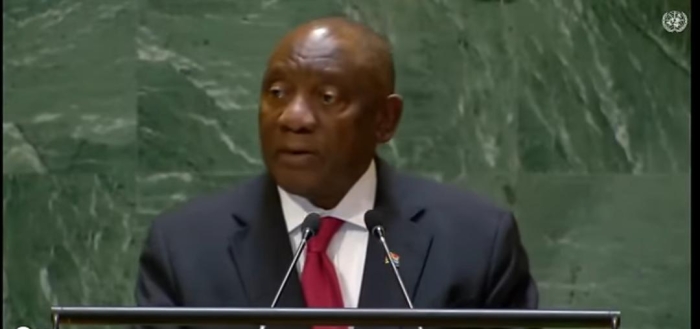The United Nations said on Wednesday that thousands more Palestinians have left northern Gaza on foot as a result of increasing despair over the diminishing food and water supplies, increased bombardment, and the impending arrival of Israeli troops and tanks.
Over 70% of Gaza's 2.3 million residents have already fled their homes, but as the conflict that Hamas' Oct. 7 attack inside Israel began to enter its second month has seen an increase in the number of Palestinians heading south. There is no sign of an end to the war, and within the beleaguered Palestinian enclave, the humanitarian situation is getting worse.

Due to the suffering of the people, Israel is coming under increasing international pressure. On Wednesday, the Group of Seven industrialized nations demanded that food, gasoline, water, and medication be delivered "unimpeded" and that there be "humanitarian pauses" in the battle. Benjamin Netanyahu, the Israeli prime minister, has so far rejected such requests while maintaining the potential of shorter pauses in hostilities.
It is unclear how Israel can keep control over the coastal enclave forever, but it has stated that its campaign to overthrow Hamas and destroy its military capabilities would be protracted and arduous. In Israel, where attention has been focused on the whereabouts of the more than 240 hostages held by Hamas and other militant organizations, support for the war is still high.
Around 15,000 Palestinians evacuated northern Gaza on Tuesday, the U.N. Office for the Coordination of Humanitarian Affairs reports, which is three times as many as left on Monday. They are utilizing the major north-south roadway in Gaza during a four-hour timeframe that Israel has declared every day.
Children, the elderly, and those with disabilities are among those escaping; the majority carried only a few essentials with them, according to the U.N. agency. While some claim they had to pass Israeli checkpoints and witnessed arrests, others waved white flags and raised their palms as they passed Israeli tanks.
Since October 21, hundreds of vehicles delivering relief have been permitted to cross into Gaza from Egypt. However, relief workers claim that the help falls well short of the growing requirements.
Gaza City's Shati refugee camp, which houses Palestinian families who fled or were pushed out of what is now Israel during the 1948 conflict surrounding its founding, was the scene of thunderous explosions that residents reported hearing throughout the night and into Wednesday.
Gaza City resident Mohamed Abed claimed, "The bombings were close and heavy."
Rear Adm. Daniel Hagari, the top spokesman for the Israeli army, declared late on Tuesday that Israeli ground forces had entered "the depths of Gaza City." Without revealing his whereabouts, the Israeli military claimed on Wednesday to have assassinated a key figure in Hamas' development of rockets and other armaments.
Israel's soldiers have not advanced far or reached Gaza City, according to Hamas. Independent verification of allegations made by either side on the battlefield was not practicable.
Israel is concentrating its efforts on Gaza City, which had a population of around 650,000 prior to the conflict and is believed by the IDF to be the location of Hamas' senior leadership as well as a massive network of tunnels. Israel has ordered hundreds of thousands of Gazans to leave the north in recent weeks, despite the fact that Israel often hits what it claims are militant targets in the south, frequently killing civilians in the process.
Still residing in the north are tens of thousands of Palestinians, many of whom are taking refuge in hospitals or UN schools. The U.N. relief office said that the final operating bakeries closed on Tuesday due to a shortage of wheat, fuel, and water. The north has been without running water for weeks. According to the report, hospitals that are limited on supplies are operating without anesthetic during procedures, including amputations.
Ameer Ghalban stated that the two of them had survived on one piece of bread a day for the previous three days while pushing an elderly cousin in a wheelchair down Gaza's major roadway. "The bulk of people have fled their homeland due to Gaza's total blockade. We don't have any wheat, water, or electricity," he said.
In the south, where hundreds of thousands of displaced people are crammed into temporary shelters, the situation is not much better. The U.N. office states that 600 people must share a single restroom at once.
Early on Wednesday, an airstrike in Khan Yunis, in the southern town, destroyed one home and injured another. An Associated Press reporter who saw the arrival of first responders carried the remains of six individuals recovered from the rubble—two women and a child—to a neighboring hospital. A spike in the toll was anticipated.














